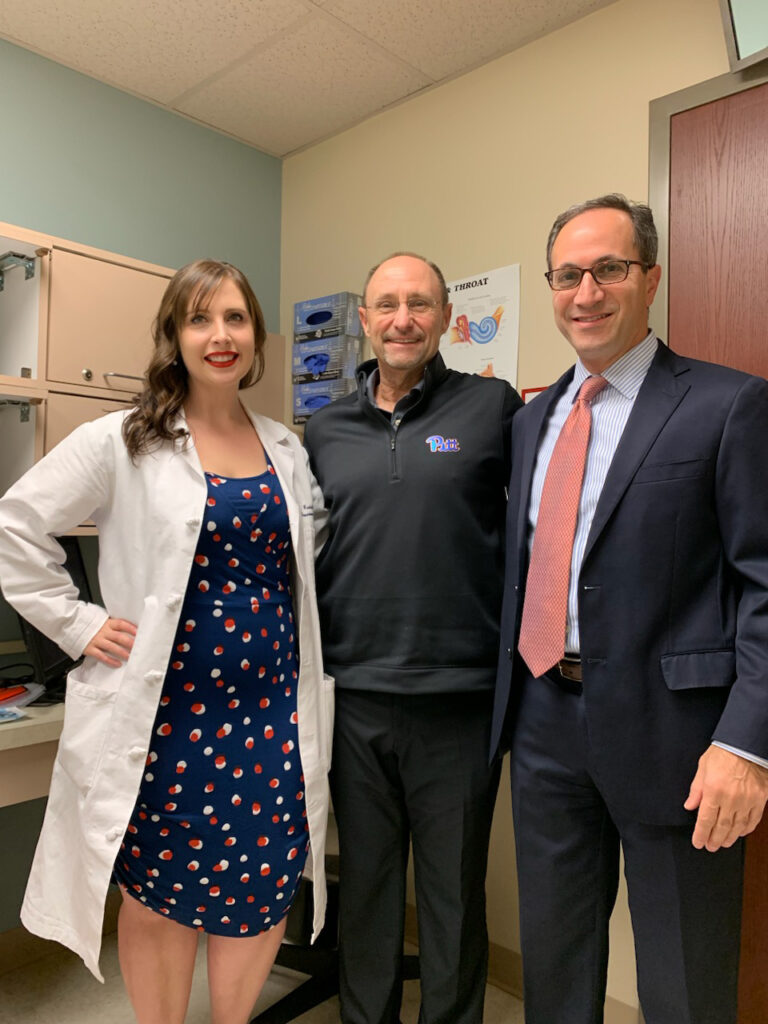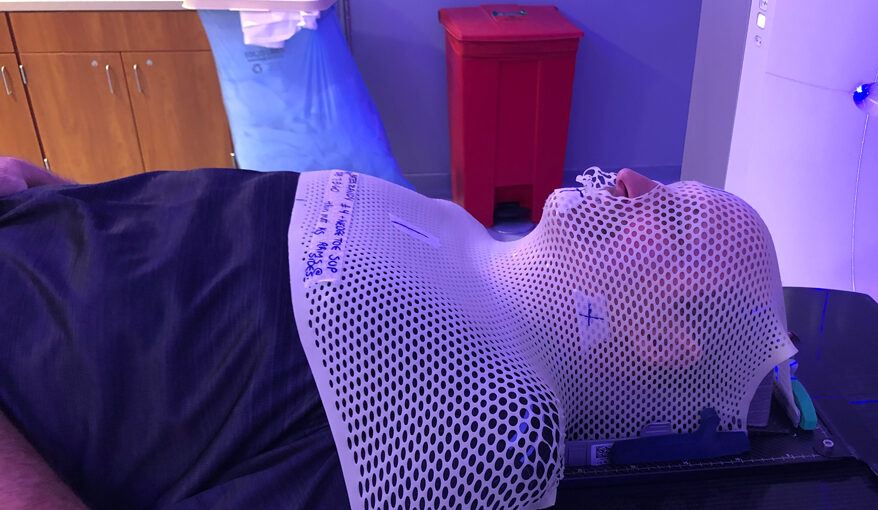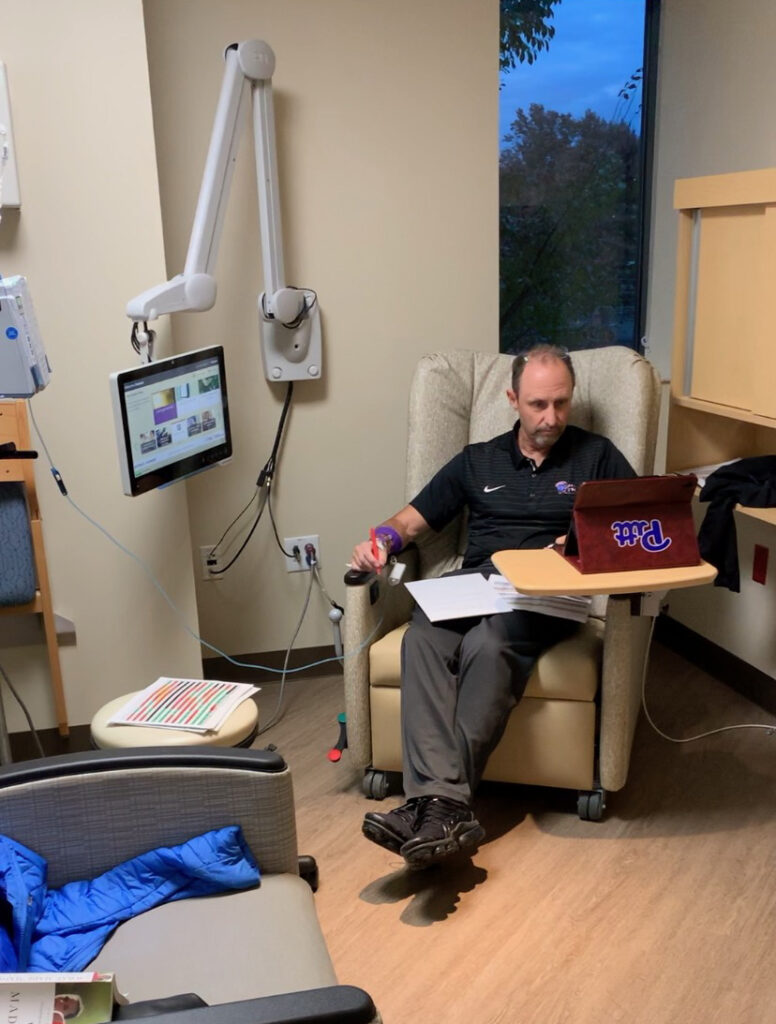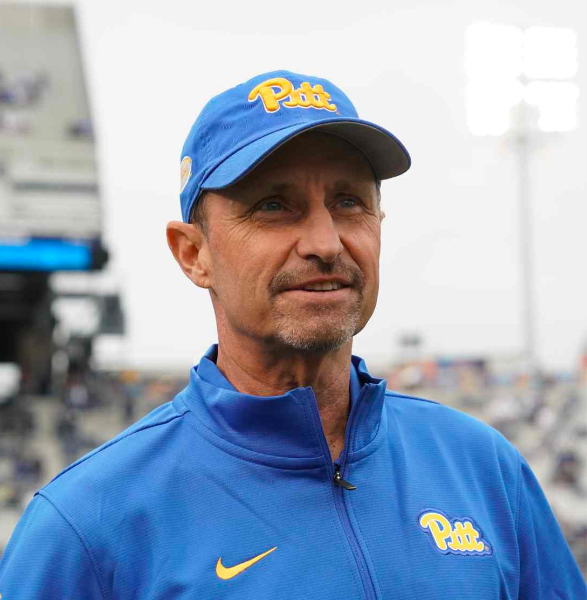Pay it Forward — Save a Life
By: Kaitlin Busch

Pay it forward—a concept many of us are familiar with, but few accomplish. For University of Pittsburgh Defensive Coordinator Randy Bates, paying it forward means the opportunity to save lives.
Pitt Football Head Coach Pat Narduzzi requires his staff members to get a yearly physical before the start of spring camp, which came as a surprise to Randy. “In my 39-year career, I have never coached anywhere where we had to do that,” he reflected. “It was a blessing I went down to see our team physician [at the time], Dr. Mares.”
Dr. Aaron Mares, now the Pittsburgh Steelers team physician, found a small lump on the right side of Randy’s throat in the spring of 2018—multiple tests followed in the coming months, including biopsies. “Sitting there for the second one, I had a pretty good idea something was probably wrong. And then a couple of days later, I’m sitting in Dr. Ferris’ office, and I have cancer,” Randy said. “I’m not sure I heard another thing after he said that. The first thing that came to mind was, ‘Will I survive?’”
“Coach Bates had developed tonsil cancer, which, unfortunately, an increasing number of Americans have experienced,” Dr. Robert Ferris, director of UPMC Hillman Cancer Center and a head and neck cancer expert, said. “It can be removed using our surgical robot working through the mouth.”
In late February 2019, Randy began the battle of his lifetime. For the next 10 months, he fought – on and off the field – to beat cancer.
Dr. Ferris performed robotic surgery on March 19, removing 51 lymph nodes and Randy’s tonsils, closing the incision with nearly 150 stitches.
“My wife and I both thought the surgery would be no big deal. We were in the middle of spring football practice, and I planned to miss a Friday and a Saturday. We were off on Sunday, and I would come back to practice on Monday,” Randy recalled. “I remember waking up in the hospital and my wife on the phone with Coach Narduzzi, saying this might be a little more intricate than I thought. I had stitches from my ear to my Adam’s apple and then stitches inside.”
Randy quickly realized his cancer diagnosis and treatment weren’t something he would be able to hide from the team. Six days after surgery, he told his fellow Panthers of the rough journey ahead and only had one request: “Keep it within the football family.”
A quintessential team player, Randy wanted to keep the spotlight on the team that season – not his health.

“Ironically, the Pitt football family is between 125 and 150 people, and the amazing thing with these young 18- to 24-year-old men is that nobody outside of the family said a word about it until I was deemed cancer-free.”
Six weeks after surgery, he started a radiation clinical trial, which focused on his neck. Randy underwent 25 treatments – five days a week for five weeks – at UPMC Presbyterian. He was fitted with a plastic mesh mask to keep his head still during treatment and experienced side effects, including dry mouth, difficulty swallowing, nausea, tooth decay, and mouth and gum sores.

“The hardest part for me during the season was having enough energy,” he explained. “The radiation created such bad sores in my throat that I couldn’t eat, so I lived on BOOST for four months. I didn’t have a great deal of energy, and I lost a lot of weight, so I’d hold my meetings with the players, and then I’d come into my office and lay down for a little bit before I did more.”
After finishing his radiation treatment, Randy underwent immunotherapy as well. He scheduled those monthly treatments, which lasted between one and two hours, on Thursday evenings before home games so his recovery wouldn’t affect his travel with the team. When possible, he also requested that his nurse place the IV in his left arm so he could still use his right hand to grade tape on his iPad during treatment.
The 2019 season was difficult for Randy, and he credits his wife, Tracey, and his Panthers family for getting him through it. “I had a tremendous group of people who cared for me – Dr. Mares, Pat Narduzzi, assistant coaches who pretty much carried the load for me, and our defensive players who checked in,” Bates said. “The most support I had was from my wife. I had some bad days at home; she was the only one who saw that and had to live through it. And she did a great job of keeping me going.”
Randy was deemed cancer-free on December 26, 2019, the same day as the Panthers Quick Lane Bowl Game, where they defeated Eastern Michigan University 34-30. After the game, he told those who endlessly and irrevocably supported him through the most brutal season of his life, “We have two wins to celebrate today.”
Today, Randy has an L-shaped scar from his ear down to the bottom of his throat and still experiences some side effects from his treatment, including numbness in his right arm and a raspy voice. While he can’t throw a football anymore, Randy survived, thanks in part to the care he received at UPMC Hillman Cancer Center.
“UPMC is at the forefront of research and cancer treatment, and it’s very impressive. When I was first diagnosed, I looked at Cleveland Clinic, Robert H. Lurie Comprehensive Cancer Center of Northwestern University, and MD Anderson Cancer Center. I stayed here in Pittsburgh because UPMC is at the forefront of immunotherapy research,” Randy said. “Dr. Ferris, in my case, is one of the top people in the country for the kind of cancer I had.”
Because he survived, he wants to help others survive by paying it forward. The Pittsburgh Post-Gazette ran an article on his cancer journey in December 2019, and a handful of people reached out to Randy afterward to let him know that his story inspired them to have a physical, which resulted in the start of their own fight. “I was able to help them through it by telling them what was coming next,” he said.
“Randy is a generous and supportive human being who regularly teaches and mentors many of our young and promising Pitt scholar-athletes on and off the football field, helping them create a path for lifelong success,” Dr. Ferris said. “We are grateful to have played a part in his cancer journey and are proud of his success as a survivor. He continues to make such a positive impact on so many lives here and across the country as a shining example of the University of Pittsburgh’s educational mission.”
Randy will be forever grateful for the treatment and care he received at UPMC Hillman Cancer Center. He donates to the Head & Neck Cancer Immunology Fund at the University of Pittsburgh and supports the Pitt Athletics team riders in Rush to Crush Cancer. “I give back because I know more people have to go through this, and the more research done, the better. The more I can give back, the more someone else down the road can survive.”
